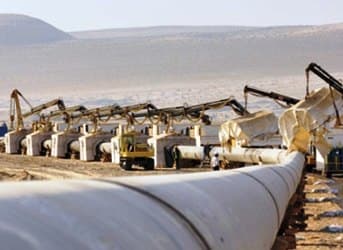Yemen is Arabia’s neglected corner, with Saudi Arabia garnering the lion’s share of media coverage.
But the impoverished nation of 24 million people seems fated to play an ever increasing role in two areas of western interest – oil exports and terrorism. Which factor will win out is anything but clear at this stage.
On 11 January Safer Exploration and Production Operations Co. announced that it had repaired its main oil export pipeline which was attacked the previous day in the country’s northeastern Marib province.
The Marib pipeline transmitted roughly 70,000 barrels per day (bpd) of Marib light crude to an export terminal on the Red Sea before a spate of attacks began in 2011, but the assaults have damaged the pipeline’s potential to carry around 110,000 bpd.
Why should the West care?
Because Yemeni stability is a top priority for both the U.S. and its Persian Gulf Arab allies because of its strategic position next to top oil exporter Saudi Arabia and shipping lanes, and oh, it also houses one of the most active wings of al Qaeda, al Qaeda in the Arabian Peninsula (AQAP), a development not perhaps so surprising, as Yemen was Osama bin Laden’s ancestral homeland.
The militant attacks in 2011 resulted in an extended closure of the Marib pipeline, forcing Yemen's largest refinery at Aden to shut, leaving the country dependent on fuel donations from Saudi Arabia and imports.
Islamic militants have been busy in Yemen for more than a decade.
Related Article: Yemen - Oil War to Intensify
In October 2000, the U.S. Navy’s USS Cole DDG-67 destroyer was subjected to a suicide attack in Aden, which was subsequently blamed on al Qaeda, killing 14 U.S. naval personnel and leaving the vessel with a 40 by 60 foot hole in its port side; repairs to the vessel cost nearly $250 million.
The following year after the 9-11 terrorist attacks on the U.S., then Yemeni President Ali Abdullah Saleh assured Washington that Yemen was a partner in the U.S. global war on terror.
But Islamic militants did not rest on their laurels. On 6 October 2002, Yemeni militants attacked the supertanker Limburg in a small boat filled with explosives at Mukalla, 354 miles east of Aden, as it was approaching the Ash Shihr Terminal several miles off the Yemeni coast. The attack killed one crewman and spilled 90,000 barrels of oil from the vessel’s 397,000-barrel cargo. The U.S. Navy's Maritime Liaison Office (MARLO) in Bahrain subsequently issued an advisory noting: "Shipmasters should exercise extreme caution when transiting...strategic chokepoints such as the Strait of Hormuz, or Bab el-Mandeb, or...traditional high-threat areas such as along the Horn of Africa." The Limburg attack caused insurance premiums for Yemeni ports to triple overnight as Lloyd’s of London declared Yemeni waters a war zone; container traffic fell by 90 percent and 3,000 jobs were lost as a result, costing Yemen $15 million per month.
For better or worse, as sporadic terrorist attacks continued, Saleh became a casualty of the “Arab spring” and on 23 November 2011 flew to Saudi Arabia to sign a Gulf Cooperation Council document to provide for political transition in Yemen.
The fiscal cost of the ongoing turmoil has concerned some thoughtful tribal leaders. On 19 December tribal sheikhs in Marib signed a petition against attacks on gas and oil pipelines, which stipulated that they would pursue saboteurs of oil pipelines and electricity towers, handing them over to the government officials for prosecution. Sheikh Ahmed Ruqaisan said he signed the petition as electricity and oil are public interests for all Yemeni citizens, stating, “They should not be attacked.”
So, what’s at stake here in Arabia’s forgotten corner? The U.S. government’s Energy Information Agency reported that Yemen “had proven crude oil reserves of 3 billion barrels as of January 1, 2012.” Yemeni authorities place the figure far higher. Last October Yemen's Petroleum Exploration and Production Authority head Nasr al-Humaidi stated that Yemen's oil reserves were estimated at 11.9 billion barrels of oil before noting that the country's oil industry requires more investment, which could see updated technology likely increasing the estimate further.
But the wild card here remains the Yemeni government’s ability to tamp down on terrorism, and in this Sanaa has a discreet but stalwart ally, the U.S. which in 2012 conducted 53 drone strikes against militants, which totaled 18 in 2011.
Yemen’s National Security Agency head Ali Hassan al Ahmadi said during a 8 January press conference that "Yemeni-American cooperation, including the use of friendly aircraft, will continue" against AQAP targets would “continue as long as al Qaeda continues to operate in Yemen”
Ahmadi’s sentiments notwithstanding, few oil companies are willing to enter such a shambolic situation, whatever the potential profits, so it seems likely that Yemen’s hydrocarbon riches will remain largely undeveloped for the foreseeable future until al Ahmadi’s and Sheikh Ruqaisan’s pronouncements are backed up by some concrete results.
By. John C.K. Daly of Oilprice.com

















